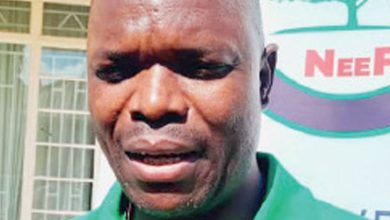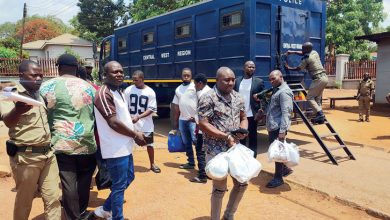Tragic loss of Chilima, 8 others
During his 2024 Christmas Eve Mass homily at Limbe Cathedral in Blantyre, Archbishop Thomas Luke Msusa described the year ending as the most challenging, not just for the Catholic Church family, but to the nation as a whole.
Yes, 2024 has been a difficult year for Malawi due to numerous challenges, including hunger, fuel shortages and an ailing economy that has seen prices of basic goods and services skyrocketing.

But to Msusa, just like to most Malawians, the heartrending death of Vice-President Saulos Klaus Chilima on June 10 was another tough moment.
Seven months later, and as the curtain draws on the year, Malawians are still mourning Chilima and the eight others who died along with him.
June 10 was like any other normal Monday when news broke out around lunch hour that a Malawi Defence Force (MDF) Dornier 228 (MAF –T03) carrying the Vice-President was missing.
Initial reports indicated that besides Chilima there were nine other passengers on board, but as the hours ticked by, it transpired the other person was not on the flight.
At 11 pm, almost 12 hours later, President Lazarus Chakwera held a special address to announce to the world about the missing military plane, which was scheduled to land at Mzuzu Airport from Kamuzu International Airport (KIA).
The aircraft left KIA at 9.17am with Chilima and eight others to attend a funeral in Nkhata Bay of the late Ralph Kasambara, (SC), former Attorney General and Justice Minister.
Chakwera told the world he had contacted neighbouring countries and diplomatic partners, including the governments of the United States of America, Britain, Norway and Israeli, with specialised technologies, to help in the search of the missing plane.
However, the search on that Monday yielded nothing until it was suspended. Come Tuesday, several search teams led by MDF, Malawi Police Service and the Malawi Red Cross Society were dispatched to Nkhata Bay.
But as anxiety built up, a teary-eyed Chakwera carried out his solemn duty at midday on June 11 to inform a nation on edge and an incredulous world that the military aircraft had crashed at Nthungwa, in the Viphya Plantations.
The search and rescue operation Chakwera had ordered found the aircraft “completely destroyed, with no survivors, as all passengers on board were killed on impact”.
The aircraft wreckage was discovered near a hill in the forest, about five kilometres east of the Lilongwe-Mzuzu M1. A battle for survival could not be won.
“Words cannot describe how heart-breaking this is, and I can only imagine how much pain and anguish you all must be feeling at this time, as well as how much pain and anguish you all will be feeling in the coming days and weeks as we mourn this terrible loss,” mourned Chakwera.
The aircraft was heavily damaged.
“As he spoke, the nation’s mourner-in-chief was suppressing sobs that betrayed his personal grief and loss even as he consoled and comforted a stunned citizenry.
“Just like that, his most senior governing partner in the Tonse Alliance, the man without whose sacrifice he probably would never have become the country’s President, was gone,” wrote The Nation of June 12 2024.
It took almost four hours for the remains of the passengers to be retrieved and transported to Raiply aerodrome at 3.51pm before being ferried to Lilongwe by two helicopters, one belonging to the Zambia Air Force.
The eight included former first fady Patricia Shanil Dzimbiri, Dan Kanyemba, the Vice-President’s official clinician, Lukas Kapheni, the Vice-President’s Aide-de-Camp (ADC) and Chisomo Chimangeni, who also worked as ADC.
Others were Ministry of Foreign Affairs deputy chief of protocol Abdul Lapukeni, aeroplane technician major Wales Aidin and colonel Owen Sambalopa and major Flora Selemani who were pilot-in-command and second-in-command, respectively.
As anticipated, Chakwera immediately directed that the nation observes 21 days of mourning starting on Tuesday, June 11, to Monday, July 24 in honour of the nine.
Lapuken was the first to be buried at his Chapola Village in Mangochi District on June 12 while Chilima was the last, on June 17.
Just after 1.45pm Chilima’s body finally touched the base of his grave at his Nsipe home in Ntcheu District, marking the last heroic act of the young politician’s legacy.
MDF gave Chilima a 19-gun salute with the last shot fired immediately the casket carrying his remains touched the ground six-feet under.
And the journey of a charismatic former private sector executive, who ventured into frontline politics in 2014, becoming the country’s youngest Vice-President at 41, came to an end.
Recapping the seven months, political scientist and governance scholar Wonderful Mkhutche described the accident as the country’s most tragic news since attaining democracy in 1994.
“Chilima was a man who had changed Malawi politics for better. He had scratched the margins through exceptional political communication in his speeches, political branding, and challenging the imagination of Malawi,” said Mkhutche.
He added: “Chilima was someone many looked forward to as a future leader who could have steered this country to a new direction through his corporate and marketing experience.”
One issue that has made and continues to make headlines on that accident relates to investigations into what caused it.
Soon after Chakwera announced the accident, calls amid restlessness started emerging from all quarters for government to institute an independent inquiry into the cause of the country’s most dreadful and heartbreaking accident.
On June 22 2024, advocates of independent investigations got fascinated when a team of German experts from the German Federal Bureau of Aircraft Accident Investigation (BFU) jetted into the country to start investigations.
But came August 30 2024, the advocates were left disgruntled after the German experts, in their interim report posted on their website, gave no clue on the cause of accident.
On September 29 2024, Chilima’s widow, Mary, in her Facebook post reflecting on their wedding anniversary joined calls for a commission of inquiry to know the truth about what claimed the lives of her husband and the eight others.
Finally, Chakwera succumbed to pressure and instituted a 19-member commission of inquiry on October 25, which was led by High Court Judge Jabbar Alide.
However, the institution of the commission was not without drama as one of the appointed commissioners, social and human rights campaigner Sylvester Namiwa resigned citing a decision to conduct the inquiry in camera, and not publicly, as the reason.
The commission presented its report to Chakwera last week but the findings have left many, including Archbishop Msusa, political, social and human rights advocates, with more questions than answers.





